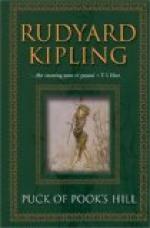‘Good,’ said the knight. ’That is Othere’s tale—even as I have heard the men in the Dane ships sing it. Not in those same valiant words, but something like to them.’
‘Have you ever explored North?’ Dan shut the book.
’Nay. My venture was South. Farther South than any man has fared, Hugh and I went down with Witta and his heathen.’ He jerked the tall sword forward, and leaned on it with both hands; but his eyes looked long past them.
‘I thought you always lived here,’ said Una, timidly.
’Yes; while my Lady AElueva lived. But she died. She died. Then, my eldest son being a man, I asked De Aquila’s leave that he should hold the Manor while I went on some journey or pilgrimage—to forget. De Aquila, whom the Second William had made Warden of Pevensey in Earl Mortain’s place, was very old then, but still he rode his tall, roan horses, and in the saddle he looked like a little white falcon. When Hugh, at Dallington, over yonder, heard what I did, he sent for my second son, whom being unmarried he had ever looked upon as his own child, and, by De Aquila’s leave, gave him the Manor of Dallington to hold till he should return. Then Hugh came with me.’
‘When did this happen?’ said Dan.
’That I can answer to the very day, for as we rode with De Aquila by Pevensey—have I said that he was Lord of Pevensey and of the Honour of the Eagle?—to the Bordeaux ship that fetched him his wines yearly out of France, a Marsh man ran to us crying that he had seen a great black goat which bore on his back the body of the King, and that the goat had spoken to him. On that same day Red William our King, the Conqueror’s son, died of a secret arrow while he hunted in a forest. “This is a cross matter,” said De Aquila, “to meet on the threshold of a journey. If Red William be dead I may have to fight for my lands. Wait a little.”
’My Lady being dead, I cared nothing for signs and omens, nor Hugh either. We took that wine-ship to go to Bordeaux; but the wind failed while we were yet in sight of Pevensey, a thick mist hid us, and we drifted with the tide along the cliffs to the west. Our company was, for the most part, merchants returning to France, and we were laden with wool and there were three couple of tall hunting-dogs chained to the rail. Their master was a knight of Artois. His name I never learned, but his shield bore gold pieces on a red ground, and he limped, much as I do, from a wound which he had got in his youth at Mantes siege. He served the Duke of Burgundy against the Moors in Spain, and was returning to that war with his dogs. He sang us strange Moorish songs that first night, and half persuaded us to go with him. I was on pilgrimage to forget—which is what no pilgrimage brings. I think I would have gone, but ...
’Look you how the life and fortune of man changes! Towards morning a Dane ship, rowing silently, struck against us in the mist, and while we rolled hither and yon Hugh, leaning over the rail, fell outboard. I leaped after him, and we two tumbled aboard the Dane, and were caught and bound ere we could rise. Our own ship was swallowed up in the mist. I judge the Knight of the Gold Pieces muzzled his dogs with his cloak, lest they should give tongue and betray the merchants, for I heard their baying suddenly stop.




